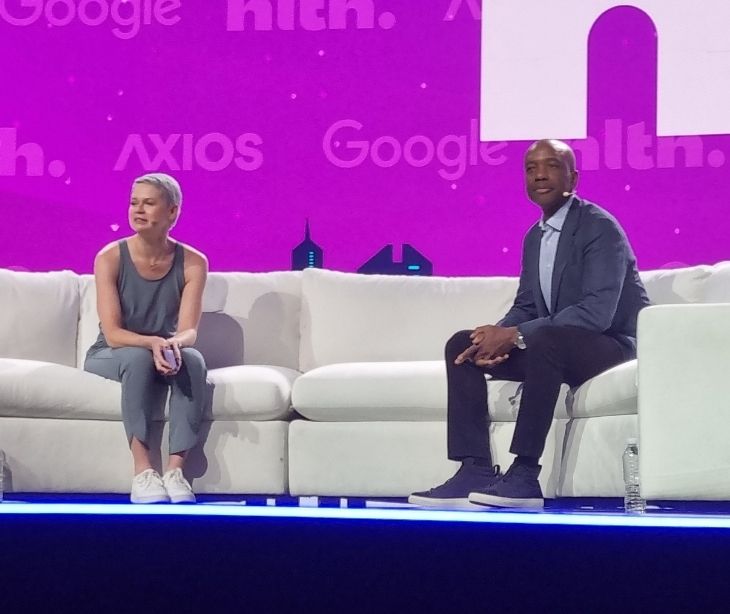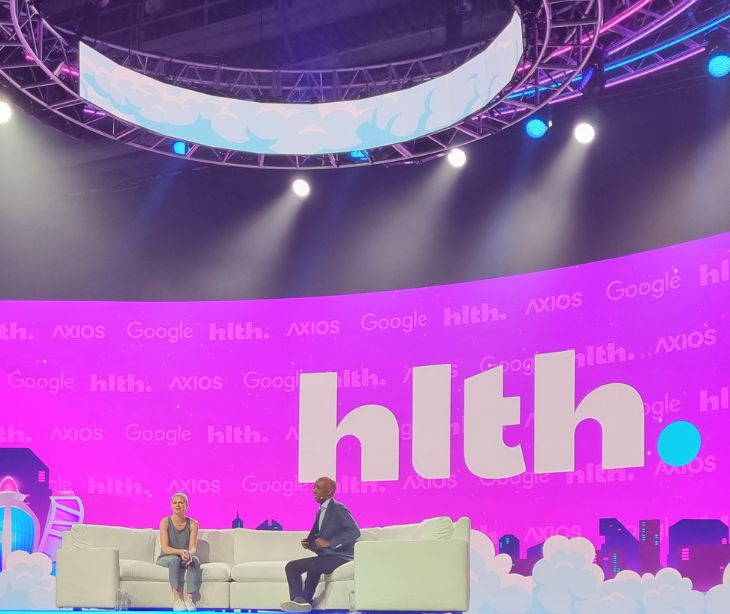2 min read
"We're not in a hurry," Google Research Expert discusses responsible use of AI
Abby Grifno
October 16, 2023

At the 2023 HLTH Conference, Google Research Expert James Manyika and Axios journalist Erin Brodwin discuss the burgeoning field of AI and how emerging companies can use new technology responsibly.
A growing field
James Manyika is one of several researchers at Google hoping to make breakthroughs in diagnosing and treating patients. Manyika's talk at the HLTH 2023 Conference, "Bringing AI to Healthcare Responsibly," focuses on AI's benefits and potential drawbacks in healthcare.
Much of Manyika's work uses AI to understand patterns for diagnosing various conditions, for instance, patterns in cancerous skin or mammograms. By reviewing patient data, AI can diagnose in minutes what may take doctors' hours.
Even though Google plays a large role in research and development, Manyika is quick to acknowledge that you don't have to be a big company to see success in the AI world.
Manyika notes that many startups and smaller companies are seeing success by using and accessing the Application Programming Interfaces (APIs) of the foundation models. This allows companies to build their own AI applications, making improvements and changes along the way.
Manyika believes this is "democratizing" AI, making it an exciting and unique time to be part of research organizations. As the field of AI grows, it's increasingly important that those utilizing the new technology do so conscientiously.
Related: Google Research expert explains AI doesn't always require private data at HLTH 2023
Using AI responsibly
AI has many capabilities, from recognizing faces to identifying cancerous skin. Unfortunately, when in the wrong hands, AI can also become dangerous.
Manyika explains that researchers must understand the benefits and risks of engaging with AI. For instance, Manyika says, "quite often these technologies can sometimes give you bias outputs or toxic outputs."
Research shows that bias can occur in AI in a variety of ways, such as biased data collection or biased AI training. When this happens, AI can make inaccurate assumptions; in the healthcare world, this could lead to misdiagnosis or improper treatment plans.
Outside of biased results, Manyika also warns of the possibility for AI to get into the wrong hands, leading to "misuse and misapplication." He adds, "That can be any number of actors, whether they are individuals or criminals, or corporations or governments."
While there is a lot to consider, Manyika believes the most important component is the overall impact on society. Researchers must work to understand how AI may affect jobs, labor models, and more.
Staying bold and considerate
While studying and utilizing AI requires precision and responsibility, that doesn't mean companies shouldn't partake in research.
Manyika encourages companies to be bold in their work but not to rush it. Google Research is guided by several principles, with the overarching goal of asking researchers two fundamental questions:
- Could the research be helpful in any way?
- Could the research be harmful in any way?
By constantly evaluating the benefits and drawbacks of AI technology, organizations can conscientiously decide what technology should be publicly available. For Manyika, these questions helped Google Research decide to not release their facial recognition API.
Unlocking the benefits of AI for the world
Once concerns are evaluated, AI can still often prove incredibly beneficial. Manyaki knows successful AI has the power to "provide health access, benefits, [and] information to many people around the world."
Manyaki believes a frequent mistake researchers make is conflating "bold" with "fast." Manyaki isn't trying to make breakthroughs immediately; that's something he believes can lead to errors or short-term fixes. Instead, Manyaki hopes organizations remain diligent and thoughtful.
"We're not in a hurry," Manyaki says. "I think the only race we feel we're in is the race to get it right."
As we learn more about the benefits and drawbacks of AI, Paubox will stay on top of the latest trends and developments to ensure AI is used in beneficial and responsible ways.
Related: HIPAA Compliant Email: The Definitive Guide.
Subscribe to Paubox Weekly
Every Friday we'll bring you the most important news from Paubox. Our aim is to make you smarter, faster.



